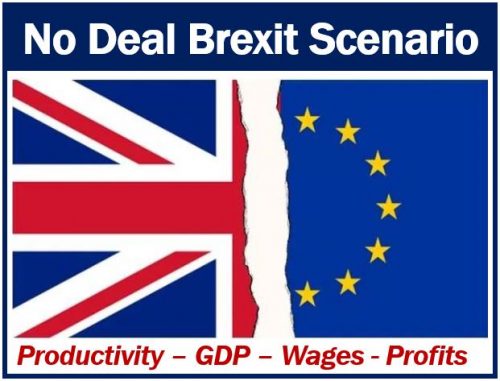In a ‘No Deal’ Brexit, the UK average real wage would decline by up to 9.6% in the short-term. Over the long-term, the decline would be about 5.2%, say researchers from Durham University Business School.
Dr Anamaria Nicolae and Mr. Michael Nower created a macroeconomic model that quantifies the effect of changes in tariffs and non-tariff barriers to trade on productivity in the UK. The model also looks at other important macroeconomic variables.
Their study is part of a wider project that examines the link between international trade and productivity.
Productivity refers to how much each unit of input produces, typically over a specific period. For example, imagine a worker in a shirt factory produced 10 shirts per day in 2017 and 11 shirts per day in 2018. That worker’s productivity increased by 10% in one year.
Their macroeconomic model provides policy evaluations for several different scenarios of trade agreements. Specifically, agreements between the UK and both non-EU and EU countries. It also includes a ‘No Deal’ Brexit scenario.
BREXIT = BRitain EXITing the European Union. In 2016, the British electorate voted in favor of Brexit. It was a close vote – 51.9% voted to leave the EU while 48.1% voted to remain.

No Deal Brexit scenario
They applied their model to a No Deal Brexit scenario so see what the potential impact on the British economy might be.
Their model predicted the following:
- Labor productivity would probably decline by up to 9.7% in the short term. In the long-term, it would probably fall by up to 5.3%.
- GDP would probably shrink by up to 9.2% and 5.1% in the short- and long-term respectively.
- The total profits of British firms would fall by 8% and 4.9% in the short-term and long-term respectively.
In the three predictions above, the declines would be relative to their levels at the announcement of the new terms of trade.
No Deal impact would probably be very large
Mr. Nower said:
“In the event of a ‘No Deal’ Brexit, the impact on the UK economy in the short-run is likely to be extremely large. In the long-run, the impact of ‘No Deal’ is much more uncertain, as by leaving the European Union Customs Union and the European Single Market, the UK does regain the ability to sign its own FTAs.”
“However, in the short run, UK trade will definitely be disrupted, meaning there will be a significant decrease in UK productivity and real wages too, as exporting firms will cut their employment, and workers are forced to move into less productive jobs.”
Video – What is International Trade
International trade refers countries doing business with each other, i.e., nations buying and selling things from and to each other.
